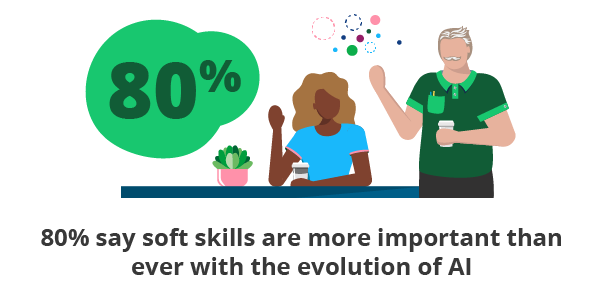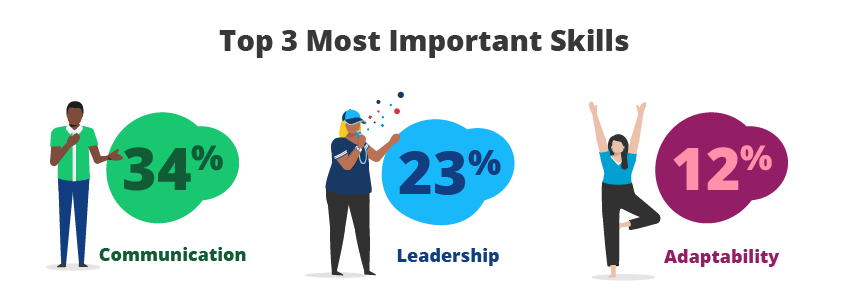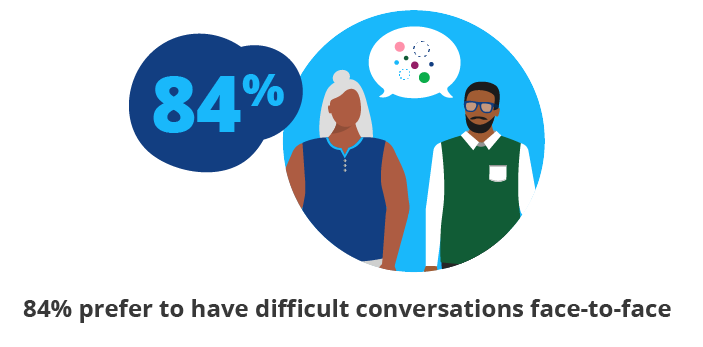Taking the Person Out of Interpersonal: Why AI Can Never Replace Soft Skills
Apr 24, 2024 | 4 min read
Artificial intelligence (AI) is becoming increasingly inevitable. Whether it’s that omnipresent chatbot everyone talks about, automated note taking in video calls, or utilizing the skills of an AI virtual assistant for administrative tasks, for many, AI is becoming a more, dare we say, natural part of daily life.
But what happens if you want to remember that one seemingly unimportant thing your coworker said (and the bot missed) that sparked an idea, or you need to have a sensitive conversation with a colleague about a recent project? In this increasingly technological world, are chatbots replacing the personal touch of soft skills in the workplace? And how do we feel about that?
With the increasing ubiquity of AI, Wiley Workplace Intelligence sought to understand if, and how, people are using AI to communicate in their daily lives. Since its inception, copious uses for AI assistance have emerged, and we were curious if individuals are leveraging these technological shortcuts to make communication a bit easier.
AI Not Replacing Humans When It Comes to Soft Skills
We surveyed 2,014 people, and the results were nearly unanimous: the evolution of AI will never replace the art of communication.
80% of our survey respondents shared that soft skills are more important than ever with the evolution of AI. While AI can be downright helpful in some areas, those surveyed sent a message loud and clear than a bot cannot replace the intuitive nature of human connection.

A bot doesn’t know that your colleague has been caring for an ailing family member and may need some extra grace around the workplace, or that your boss is doing the job of three people, or that your direct report is learning a new skill in addition to their normal workload.
Taking time to get to know and truly understand the people you work with goes a long way in creating meaningful connections and productive workplaces. The individuality that we all bring to our jobs is what makes strong teams and good cultures.
Skill Building for the Future of Work
Looking to the future of work in an increasingly technological world, our survey respondents reported that communication and leadership are the top ranked skills needed in the workplace, followed by adaptability, which speaks to the need to evolve in our ever-changing environment.

Communication and leadership stand out as skills that no bot can replace. Genuinely effective communication can make the difference between whether your organization thrives or struggles to survive in the new normal. Clarity of vision, problem solving, helping your teams navigate conflict, adaptability, and creating positive cultures are all skills that need a human element to truly be successful.
Conflict Best Managed Face-to-Face
Our research found that even the trickier elements of our work lives, like conflict management, are not being replaced by AI. How easy would it be to have a chatbot draft a quick email about a sticky situation at work? Quite easy. And yet, 84% of people shared that they are navigating these challenging workplace scenarios face-to-face which prioritizes people and effects true change that can ultimately have a positive impact on workplace culture.

After all, humans are complex and reactions to difficult situations can be, well, human. And taking the time to connect, communicate, and work through conflict at a personal level can make all the difference.
All of this said, strategically leveraging AI to automate parts of your job (administrative tasks, for example) can be beneficial, efficient, and create space for the elements of work, and life, which thrive with genuine human connection.
Soft skills may come easier to some than others. Utilizing personality assessments and facilitated learning experiences can help you build these skills in your organization. With solutions like Everything DiSC® and The Five Behaviors®, you can get to know yourself and others, build skills that no bot can ever replace, and create organizations that harness the power of our modern times while keeping the humanity that makes us special. And I think we can all agree that humanity is something that we need a little more of.
